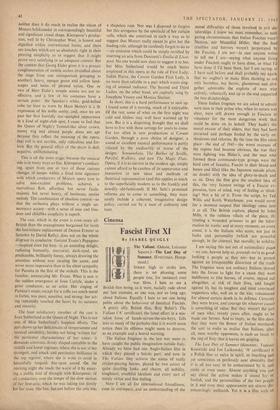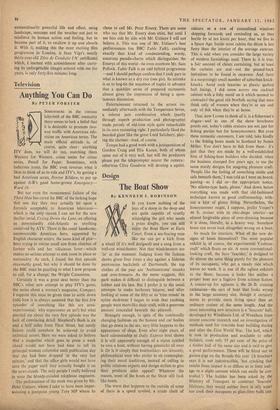Cinema
Fascist First XI
By ISABEL QUIGLY
The Valiant. (Odeon, Leicester Square.)—The Last Day of Summer. (Everyman, Hamp- stead.) STRIKE high or strike low, there is no pleasing some people (me,' for instance) over war films. I hate to see a British film being, as it were, racially rude about our late enemies, as one was, not so long ago, about Italians. Equally 1 hate to see one being polite about the behaviour of fanatical Fascists. A pretty silly British film, Roy Baker's The Valiant (`A' certificate), the latest effort in a mis- taken form of hands-across-the-sea-boys, falls into so many of the potholes that it is worth more notice than its silliness might seem to deserve, as an example and a horrid warning.
The Italian frogmen in the last war seem to have caught the public imagination outside Italy. Already we have had one Anglo-Italian film in which they played a heroic part; and now in The Valiant they achieve the status of really cricket-playing heroes, played by two actors of quite dazzling looks and charm, all nobility, toughness, youthful idealism and every sort of manly virtue and fine feeling.
Now I am all for international friendliness, even in retrospect, and an understanding of the moral difficulties of those involved in evil die tatorships. I know we must remember, as miti- gating circumstances, that Italian Fascism wasn't Nazism, nor Mussolini Hitler; that the final cruelties and horrors weren't perpetrated by the Fascists. I am not—in case anyone writes to tell me I am—saying what anyone living under Fascism ought to have done, or what I'd have done if I'd been there, but I am saying. as I have said before and shall probably say again, that we oughtn't to make films showing as no only harmless, but heroic, glamorous and alto gether admirable the exploits of men who actively, voluntarily and up to the end supported the two dictatorships.
These Italian frogmen we are asked to admire were men in their prime who, when its nature ss as clear, were still drawn enough to Fascism to volunteer for the most dangerous work that could be done on its behalf. They hadn't the moral excuse of their elders, that they had been attracted and perhaps fooled by the early en thusiasms and reforms. By the time the film takes place--the end of 1941—the worst excesses of the regime had become obvious, the war they were fighting was Hitler's, and the men who formed these commando-type groups were the hard core of fanatics, Fascist in their blood and bones and filled (like the Japanese suicide pilots, no doubt) with the idea of glory-in-death and so on. Does the film give the smallest idea of this, the very faintest twinge of a Fascist ex- pression, turn of mind, way of feeling or think- ing? Not a bit of it. From the script, by Ted Willis and Keith Waterhouse, you would never for a moment suspect that ideology came into it at all. The British captain, played by John Mills, is the ruthless villain of the piece, ill treating a wounded prisoner to get the infor- mation he wants; and at every moment, on every Count, it is the Italians who score, not just in looks and personality (which are powerful enough, in the cinema), but morally, in nobility I am saying this not out of nationalistic pique —no one, heaven help us, pretends we're as good• looking a people as they are—but to protest against an irresponsible distortion of the truth The frogmen were not ordinary Italians shoved into the forces to fight for a cause they were indifferent to (the heroes, of course, stayed out altogether, at risk of their lives, and fought against it), but its toughest and most convinced supporters who, well on in the war, volunteered for almost certain death in its defence. Certainly they were brave, and courage (in whatever cause) is something of value. But they weren't the sort of men who,' twenty years after, ought to be made our heroes. And to imply, as the film does, that they were the flower of Italian manhood, the sort to make us realise that Italians, after all, were worthy opponents, is such an insult to the rest of Italy that it leaves me gasping.
The Last Day of Summer (directors: Tadeusi Konwicki and Jan Laskowski; 'A' certificate) is a Polish film so naïve in spirit, so touching and yet sometimes so perilously near absurdity that it is all too easy to be embarrassed by it, and smile or even sneer. Almost anything you can say about the action makes it sound fey or foolish, and the personalities of the two people in it and even their appearances are almost dis- concertingly unfilmish. Yet it is a film with all extraordinarily powerful life and effect, using landscape, seascape and the weather not just to reinforce its human action and feeling, but to become part of it, to swallow it up and absorb it. With it, making this the most exciting film programme in London, is Jean Vigo's nearly thirty-year-old Zero de Conduite (`A' certificate) which, I learned with astonishment after carry- ing its unforgettable images around with me for years, is only forty-five minutes long.































 Previous page
Previous page